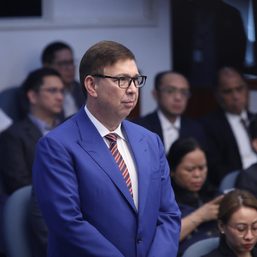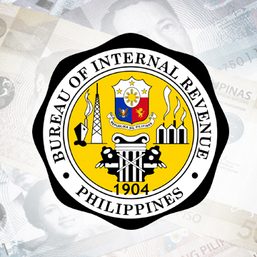SUMMARY
This is AI generated summarization, which may have errors. For context, always refer to the full article.
![[In This Economy] As new finance chief, will Ralph Recto usher in new taxes (again)?](https://www.rappler.com/tachyon/2024/01/new-finance-chief-ralph-recto-january-12-2024.jpg)
The cat is finally out of the bag.
On January 11, it was confirmed that Batangas 6th District Representative Ralph Recto will be replacing Benjamin Diokno as finance secretary.
For many months, Diokno dodged rumors and speculations by journalists. But there were telltale signs that Recto’s appointment was impending. In November 2023, for instance, President Ferdinand Marcos Jr. brought with him both Diokno and Recto at the APEC Summit in San Francisco.
Why was Recto chosen for this post?
There could be many political reasons. But one good justification is that Recto is credited (also heavily vilified) for advocating the expanded value-added tax (EVAT) law almost two decades ago.
That law, which raised the VAT from 10% to 12%, is often said to be the reason why Recto failed to snag a second senatorial bid in 2007.
But objectively, that law helped to save our economy already on the brink of fiscal crisis. If you know this bit of Philippine economic history, Recto’s appointment as new finance secretary will make more sense.
Fiscal crisis and EVAT
The Philippine economy was in dire straits in the early 2000s.
It was so bad that in August 2004, 11 UP School of Economics professors teamed up to write a joint statement titled, “The deepening crisis: the real score on the public debt.”
They cited grim statistics about the public coffers. In 2003, the total national government debt was measured at 78% of total national income, and increasing quite fast. (By comparison, the debt-to-GDP ratio in 2022 was just 61%.)
Worse, if you add the debt of government corporations, the public debt at that time reached 130% of GDP!
One big reason for these disturbing numbers is that the government’s budget deficit (or revenue shortfall) had ballooned since the late 1990s, largely because of “falling revenue and tax efforts.”
What this all means is that by the early 2000s, the government was desperate for extra money. This is why the UPSE professors recommended that government “raise revenues by closing off tax-loopholes, updating existing taxes, passing new revenue measures, and reallocating spending.”
The paper had a huge say in the debates at that time, culminating in the Recto EVAT law, which took effect on New Year’s Day of 2006.
The graph below shows the macroeconomic impact of EVAT.
First, there was a notable increase in the government’s revenue and tax efforts: revenues and taxes collected increased as a proportion of national income.
Second, in 2006, we came closest to having a “balanced budget” (revenues offsetting spending) since 1997. Of course, having a balanced budget has its own pros and cons. But from alarming levels, the deficit was brought down to less than 1% yearly from 2006 until 2008.
Third, the increased revenues and expanded fiscal space led to a shrinkage of domestic outstanding debt – the first time that happened since 1994.
Fourth, there was a record drop in the domestic debt-GDP ratio: 3.6 percentage points, a drop that has not been matched since.
In short, the EVAT law authored by Recto and others worked wonders. It was a bitter but necessary pill that contributed a lot to our economy’s recovery and prevented a full-blown fiscal crisis.
Of course, Recto can’t take all the credit, and you could say that EVAT caused some pain, too: it raised prices for select goods and services, and that it was even regressive (roughly, hurting the poor more than the rich).
But one thing’s for certain: many Filipinos have already forgotten the ills that EVAT was trying to solve, and did solve, thanks to the political will of Recto and other politicians who saw the need for such a measure – even at the cost of their political careers.
‘Good economist’?
Fast-forward to January 2024, Recto will be at the helm of the Department of Finance. (Interestingly, from 2008 to 2009, after his failed Senate bid, Recto also had a brief stint as the head of the National Economic and Development Authority. So it won’t be Recto’s first time as an economic manager.)
In a statement, Recto’s wife, acclaimed actress and politician Vilma Santos, said that President Marcos gave Recto the post “because he is such a good economist.”
I’m not sure Recto can be called a bona fide economist. To be considered an economist, one needs at least a master’s degree in economics. And in 2015, Recto apologized for falsely claiming that he finished two master’s degrees, one in “strategic business economics” and one in public administration.
Recto is more like a politician who worked a lot on economic issues. But precisely for making tough calls at a crucial time in our economic history, I think his appointment as new finance secretary makes more sense than people will care to admit.
Having said that, Benjamin Diokno – who is rumored to be returning to the Bangko Sentral ng Pilipinas as the last new member of the Monetary Board – will be leaving behind important projects, such as raising revenues for the Marcos government and fixing the pension system of military and uniformed personnel (MUP).
The government right now is in desperate need for revenues. The debt-to-GDP ratio is still stubbornly above 60%, and key to bringing that down is to raise new taxes, even if that’s unpopular.
Under Diokno’s watch, the DOF already forecasted that it will need to raise an extra P120.5 billion in 2024, P152.2 billion in 2025, and P183.2 billion in 2026. That’s a tall order.
Will Recto pull a Recto again, and muster the courage to push for new taxes? Maybe Recto will do a better job than Diokno in rallying politicians to enact key reforms. But only time will tell. If Recto himself has political goals in 2025, new taxes might hurt him (or maybe his wife Vilma) next year at the polls. So good luck raising new revenues.
It will also be interesting to see how Recto will work with the other economic managers, especially the new “super economic manager,” Frederick Go, to whom he will need to report.
With many fiscal challenges ahead, we can only wish Recto: Good luck! – Rappler.com
JC Punongbayan, PhD is an assistant professor at the UP School of Economics and the author of False Nostalgia: The Marcos “Golden Age” Myths and How to Debunk Them. JC’s views are independent of his affiliations. Follow him on Twitter (@jcpunongbayan) and Usapang Econ Podcast.
1 comment
How does this make you feel?


![[In This Economy] Is the Marcos government unlawfully dipping into PhilHealth funds?](https://www.rappler.com/tachyon/2024/07/marcos-government-philhealth-funds-july-12-2024.jpg?resize=257%2C257&crop=425px%2C0px%2C1080px%2C1080px)


![[EDITORIAL] Apat na taon na lang Ginoong Marcos, ‘di na puwede ang papetiks-petiks](https://www.rappler.com/tachyon/2024/07/animated-bongbong-marcos-2024-sona-day-carousel.jpg?resize=257%2C257&crop=280px%2C0px%2C720px%2C720px)
![[In This Economy] Delulunomics: Kailan magiging upper-middle income country ang Pilipinas?](https://www.rappler.com/tachyon/2024/07/in-this-economy-upper-middle-income-country.jpg?resize=257%2C257&crop=421px%2C0px%2C1080px%2C1080px)

![[EDITORIAL] Marcos Year 2: Hilong-talilong](https://www.rappler.com/tachyon/2024/07/animated-bongbong-marcos-2nd-sona-carousel.jpg?resize=257%2C257&crop=136px%2C0px%2C720px%2C720px)
![[Newspoint] A fighting presence](https://www.rappler.com/tachyon/2024/07/thought-leaders-a-fighting-presence.jpg?resize=257%2C257&crop=441px%2C0px%2C1080px%2C1080px)

![[Ask The Tax Whiz] Output VAT credit on uncollected receivables: What taxpayers must know](https://www.rappler.com/tachyon/2022/11/tax-papers-hand-shutterstock.jpg?resize=257%2C257&crop_strategy=attention)
![[Ask The Tax Whiz] What’s new on invoicing requirements under the Ease of Paying Taxes law?](https://www.rappler.com/tachyon/2024/06/tax-whiz-receipts.jpg?resize=257%2C257&crop=459px%2C0px%2C720px%2C720px)

![[Ask the Tax Whiz] Withholding tax under Ease of Paying Taxes law](https://www.rappler.com/tachyon/2022/11/tax-papers-shutterstock.jpg?resize=257%2C257&crop=205px%2C0px%2C900px%2C900px)
The focus is only on raising taxes. Is it because President Marcos Jr.’s Government does not want to talk about reducing Government Expenses?